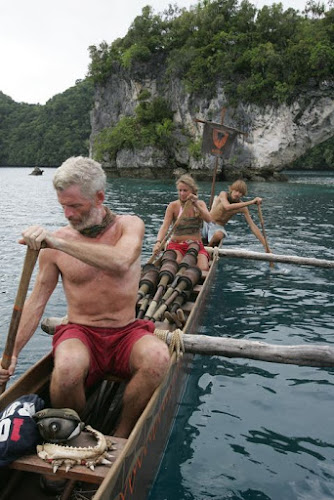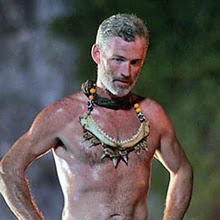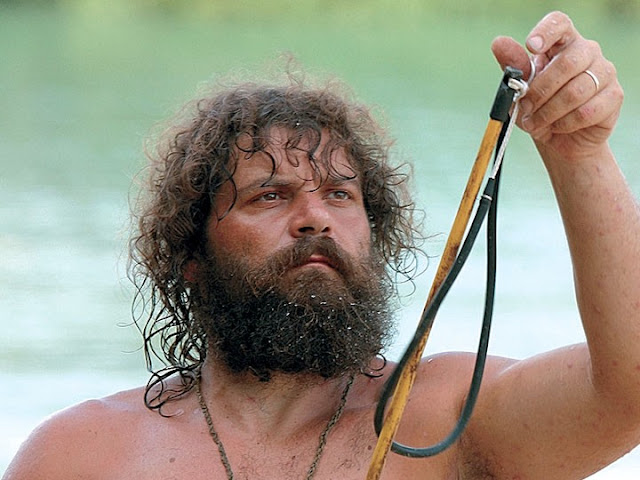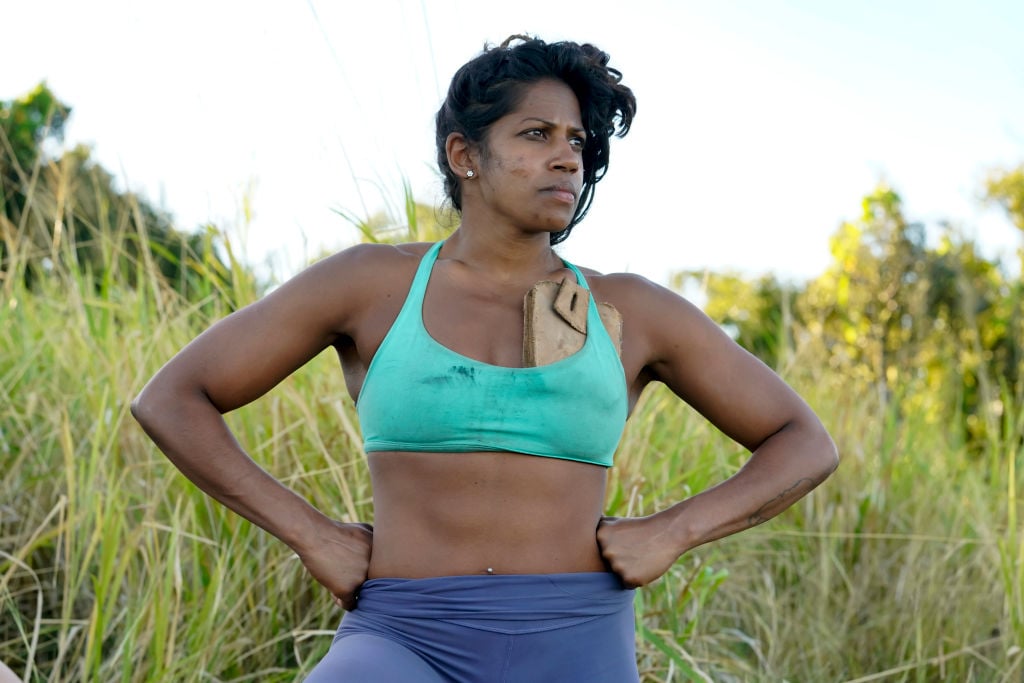Survivor's third season,
Africa, further raised the bars of adventure, entertainment, strategy, melodrama and glamour which
The Australian Outback had already heightened from the show's spare premiere season. That first season already felt antiquated by the time
Africa aired in the fall of 2001, with its increased production costs, deluxe challenges, slick editing, ornate Tribal Councils and especially, its captivating, TV-ready cast. Viewing it retrospectively,
Africa has its share of pitfalls - including a streak of predictable vote-offs and the show's first sexual harassment vagaries - but that charming cast was still enough to elevate the season into the show's pantheon.
Just as they'd been the first two seasons, Survivor's castaways were initially split into two tribes. The Boran tribe lost the first two immunity challenges, but those losses condensed them into an impressive and cohesive group of six. Meanwhile, the Samburu tribe fractured into mini-tribes of young and old, with both groups of four managing to embody the other's worst ageist stereotypes. When Samburu lost its first immunity, the two groups dug their heels in. The first tiebreaker - which later provoked espionage and intrigue - was previous votes received. Samburu's first victim was determined by the second tiebreaker: trivia questions. Nobody won that embarrassing trivia tiebreaker, but young Lindsey did a little less to lose it than fortysomething dentist Carl, giving the younger group an uncrackable numbers advantage. Erratic Linda was next to go, leaving Georgia flight attendant Teresa and an ex-military dickhead named Frank on death row.
Survivor conspiracy theorists received their first ammunition stock two weeks later in the form of the show's first tribal swap. Samburu's young Alpha, Silas, suddenly found himself on a new tribe along with Teresa and Frank. Silas had already been identified by Boran's Ethan as his most concerning adversary. Teresa and Frank were thrilled to join former Boran members in executing the strapping Tennesseean.
While the tribal swap unfairly screwed Silas, it did provide great intrigue for the other tribe. Three ex-Boran members were pitted against three young ex-Samburus, with the well-established first tiebreaker of previous votes received looming over them. The ex-Samburus knew they'd lose the tiebreaker if the ex-Borans voted for Lindsey, so they waged a misinformation war. Convinced he could beat ex-Boran Big Tom in trivia, flamboyantly gay bartender Brandon offered and positioned himself as the target for ex-Boran. Meanwhile, Lindsey considered a Machiavellian blindside of her heroic ally.
Lindsey justifiably received more screen time than anyone else the first six episodes, alternating articulate deconstructions of
Survivor life and strategy with
Bacheloresque
tantrums precipitated by physical, social and emotional stressors.
Dynamic as she was, the audience was worn out by six episodes of
Lindsey. It came as a relief when ex-Boran sniffed out her previous
votes and aligned against her, and more of a relief to see Lindsey stick
with her alliance rather than the horrifying alternative she'd
considered. Lindsey found redemption at that epic Tribal, with the
snuffing of her torch completing her journey in theatrical punctuality.
That tribal revealed a dangerous new weapon in the hands of Mark Burnett & company: the Power of the Edit. It's hard to say how carefully Lindsey considered backstabbing Brandon. We have no way of knowing if Brandon considered the same. We don't know when and how ex-Boran found out Lindsey had previously received votes. We do know those mysteries made for a dramatic Tribal Council, ending in Lindsey's redemption - but again, we'll never know if her journey was as thorough and tidy as it appeared on screen.
Though Jeff Probst planted a red herring about a delayed merge, it did indeed occur as expected with ten players left. Boran had wanted to oust Clarence after two alleged incidents of food theft in the game's opening days, but held onto him for his physicality in the early team challenges. Once merged, he was quickly voted out - but only after holding a water bucket over his head for six hours in an immunity challenge. Clarence dropped the bucket only after losing a game of rock-paper-scissors he proposed to end the debilitating stalemate in which he was locked against Teresa. That six-hour effort was especially impressive because food-obsessed Clarence turned down Probst's myriad offers of treats to entice him out of the challenge. Like Lindsey, Clarence's final episode was redemptive - convincingly so, even with suspicion that was the goal of the Edit.
Teresa honorably refused to vote for Clarence after their immunity battle and treaty, instead casting her vote on Lex, Boran's Alpha. Lex embarked on a witch hunt to "cut the head off of whoever did this," provoking a comical edit in which his celebrated "gut" pointed him towards tribemate Kelly without a thought towards Teresa. But Lex was correct to trust his gut, as Kelly had indeed been scheming against him for several days. Her
hilarious, insightful eviscerations of Lex in confessional illuminated the hypocrisy in Lex's self-righteous game while accentuating her own repeat-worthy gameplay. It appeared Kelly was going to pull off the game's first great backstab, but she was vanquished when Lex managed to convince Brandon to flip against his former allies. Perhaps Kelly did enough to deserve a future return to the game, but her inane decision to reward her final vote based on a number guessing game disqualified her from consideration.
Brandon's flip stunned viewers and former allies alike. While it appeared to be a carefully meditated move of strategic treachery, Brandon later explained he simply wasn't going to align with someone as odious as Frank. Brandon quickly capitulated back to his allies, but the damage was done. Neither his old alliance nor his new one trusted him, while old enemies like Frank remained. Everyone now viewed him as the groundbreakingly cunning strategist he'd always been, and he was ambushed next. Like several before and after him, Brandon had assembled a case for a return engagement. But that case was weakened by the overstrategizing he made down the stretch along with a disconcertingly lopsided vote-out.
The show's homestretch lacked any semblance of voting intrigue, as the original Boran boringly executed Samburu until they'd consolidated to their original alliance of four power players. That core four of Ethan, Lex, Kim Johnson and Big Tom passed up an opportunity to align with the loathsome Frank (basically the neighbor dad from
American Beauty but with even less social skill). If and when I get on the show, social rejects like Frank will constitute my preferred alliances.
Even though the strategy became predictable,
Africa remained consistently engrossing. The challenges were often compelling, creative experiences tailored to the environment like rolling huge balls and herding goats, not just obstacle courses and puzzles. Their resonating rewards further highlighted Kenya's enchanting residents, two and four-legged. The players faced legitimately challenging geographic difficulties like obtaining fresh water, fighting dysentery, staying awake all night as lion sentries, and the fear of bothering the dangerous water buffalo. All of it makes you realize how formulaic and non-geographic the current South Pacific iterations of the show have become.
Above all else,
Africa remained entertaining because of the personalities of its castaways. Frank's offing left six amiable characters, each seemingly created for television. There was Kim Powers, who elevated the Cutie archetype popularized by Colleen and Elizabeth Hasselbeck to a higher level of acumen and integrity. Then went "T-Bird" Teresa, whose scrupulously honorable vote with Clarence endeared her beyond generations of future goats.
The most TV-ready of them all was Big Tom, a third-generation Virginia farmer whose extraordinary charisma will forever be undermined by explicable but unmistakable bigotry, particularly in the context of current events in the worlds of
Survivor and America. A description of his behaviors - wandering eyes, flirtatiously pouring buckets of water on female castaways half his age, the novelty he found in encountering Brandon's sexuality - surely revolts those reading about Big Tom for the first time in 2020.
And here's the part where I apologize for Big Tom's bigotry. Nothing written here can properly contextualize Tom's behaviors in the
environment in which he existed, the unwoke culture that was 2001
Survivor. The novelty of Brandon's homosexuality appeared to be just that - pure novelty. Big Tom really had never met an out-of-the-closet homosexual before. His treatment of women wasn't challenged; in fact, it was largely appreciated. Big Tom was wildly popular amongst both the men and women in his tribe. He was the first of his alliance to be knocked out because they all believed he would win Final Tribal. There wasn't a hint of any animosity towards him until the finale, when finalist Kim Johnson apologetically mentioned a hint of sexism she sniffed in the game's final days.
Big Tom is a
Survivor relic. Never again will the show consider a character who displays potentially inflammatory misogyny. Casting characters like Big Tom in the era of cancel culture is an unnecessary risk no producer will ever take again. There is no place for ignorance in today's cultural and media landscape. But that means characters like Big Tom won't ever have a chance to grow in front of our eyes, to have their ignorance revealed and replaced. There is ignorance in this world. Hiding it doesn't destroy it. Exposing it, as it was exposed for Big Tom on
Survivor, is the first step in eliminating it. Embarrassed by his inability to spell Clarence's name on his voting card, Tom immediately started a reading program for kids called "Reading is The Key to Survival" upon returning home. Tom's hope was for future generations to be a little less ignorant, a little more woke than him.
No matter your opinion of his character, Tom's behavior clearly crossed lines of sexual harassment that would not be tolerated in 2020. No producer can claim Season 39's scandals arrived unexpectedly, not after what Tom did in
Africa and Richard Hatch did in
All-Stars. Sexual harassment has been a pervasive element of
Survivor since its inception. Just as it's been a pervasive element of society since its inception.

With four left, 56 year-old retired teacher Kim Johnson won a castaway trivia challenge to save herself and oust Big Tom. She then defeated two young men - professional athlete Ethan and winner of a zillion consecutive physical immunity challenges, Lex - in a final challenge of pure endurance. Kim actually competed in every challenge contested in
Africa. Her trail was blazed a season earlier by
Australia's champion, Tina, but Kim appeared to follow that trail with even more tenacity, grace and gratitude. Tina's victory over
Australia's Alpha, Colby, came as a surprise to viewers who'd seen him garner double the screentime, challenge belts and accolades. Ethan's Edit was less impressive than Colby's, yet he defeated Kim by a 5-2 margin at Final Tribal. He won Kelly's insipid number guessing game, but still would have carried the day if he'd lost. It was an impressive victory over an impressive final group, yet Ethan rarely did anything impressive on screen. Marketing director Lex handily defeated professional athlete Ethan in challenge after challenge. Kim
outclassed him at Final Tribal. Longtime ally Big Tom was more endearing. Ethan owes his victory to measured consistency in his alliances, his demeanor, and especially his vibrant gratitude - depressingly vibrant for those who last saw him withering away on
Winners At War's Edge of Extinction. His victory was an afterthought to the geographic, social, strategic and cultural drama exhibited throughout the season.
























